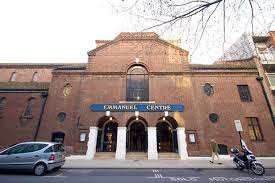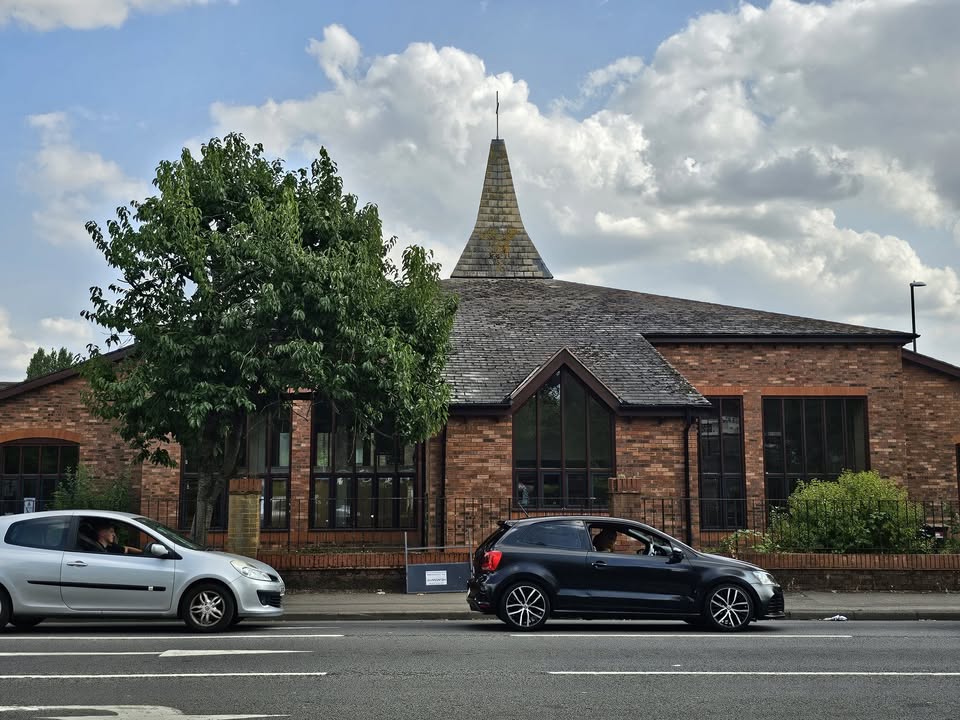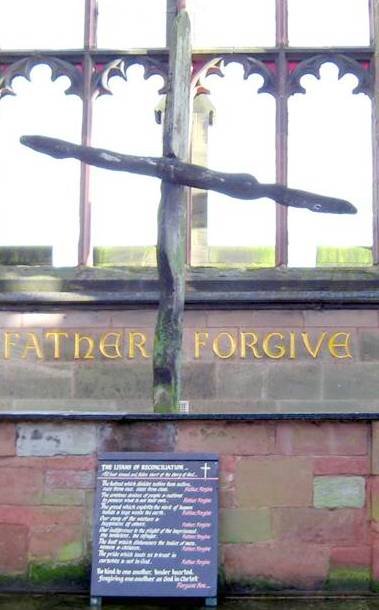Just over two weeks ago (on Sunday 18th January 2026) I led worship at Sherbourne Community Church in Coventry. Having preached there several times now, I am always honoured to be asked back!
Below is the text of my sermon (this is basically the text that I wrote beforehand but in practice I deviated from the wording at times and added in a few extra comments).
The sermon was based on two Bible readings, from the Lectionary for the day:
Isaiah 49, 1-7
John 1, 29-42
I used to work in Waterstone’s bookshop. It was over 20 years ago, but one of the memories that sticks with me is from a time when I was shelving books in the children’s section. A woman came into the shop with a small child. The child was holding a toy, which I think perhaps his mother had just bought for him. He was very excited about it. He ran up to me, although he’d never seen me before, and said, with great excitement, “Man, I’ve got – ”. And then he started to tell me enthusiastically about the toy.
He was so excited, he just wanted to tell the first person he saw. Even though he didn’t know me and just called me “man”.
I can’t remember what I said in response. I probably said, “That’s good”, or something like that. But I do remember feeling uplifted by a child being so delighted by something that he wanted to tell everyone. And I remember wondering if the world might be a better place if we all rushed around and told each other when something good happened to us.
If that did happen, on the one hand, we might be uplifted by each other’s good news. On the other hand, if you’re struggling with life, and things are tough, then hearing other people sounding cheerful is not always easy.
So how did Simon feel when his brother Andrew told him, “We’ve found the Messiah”? John’s Gospel gives the impression that Simon shared some of Andrew’s enthusiasm, for he readily went to meet Jesus, who gave him the name Peter.
Now we could spend a lot of time talking about whether this all happened in the way that John’s Gospel describes it. This account differs to the accounts in Matthew, Mark and Luke, which tell us that Jesus called Andrew and Simon Peter while they were fishing.
Some people are keen to try to make these accounts fit in with the account in John’s Gospel. Perhaps these two things happened at different times, perhaps Jesus had already met the disciples before he called them while fishing and so on.
All these things are possible. But I can’t help thinking that if we put our energy into trying to make these different accounts fit together, we may be missing the point. It’s rather like responding to the parable of the Good Samaritan by asking whether the money the Samaritan left behind was really enough to pay for an inn. That’s not what the story of the Good Samaritan is about. It might be more helpful to ask what the writer of John’s Gospel is trying to tell us in this passage.
Andrew is excited. He says, “We have found the Messiah!”. In his excitement, like that small child in the bookshop, he wants to tell people. He tells his brother, Simon. And Simon’s instinct is to want to meet Jesus.
This is about how these people respond to Jesus: with excitement, with curiosity, with hope, with a desire to know Jesus, with enthusiasm for sharing the news. This is the response of people hearing good news.
It seems to me that as Christians, we often forget that we are proclaiming good news. Several times a week, I walk between New Street station in Birmingham, and Aston University where I work as a chaplain. One day I was walking back to the station after quite a tiring day and I passed one of the Christian street preachers who can be found in central Birmingham. He was warning passers-by that they had been living with no regard to God or the future, enjoying themselves without thought of the consequences but that they would soon find that they had – as he put it – “maxed out the credit card” – and that they had a debt of sin that they were unable to pay.
I looked round at the people in the street. There were people like me, on the way home from work. There were parents with small children, some of them clearly struggling. There were homeless or semi-homeless people begging on the sides of the street or under the influence of alcohol or other drugs, slumped in corners. There were people going in and out of shops. On the whole they didn’t look like a group of people enjoying riotous lifestyles with no thought of the consequences.
I considered approaching the preacher and saying, “Have you got any good news?” Because he seemed to have forgotten that the word “gospel” translates the Greek word “evangelion”, which means something like “triumph” or “good news”. I wonder if preachers like this go round knocking on people’s doors and saying, “Have you heard the bad news?”
The Bible makes clear that the gospel of Jesus Christ is good news. Mark’s Gospel, the oldest of the gospels we find in the Bible, begins simply, “The beginning of the good news of Jesus Christ”.
Of course, the Gospel involves challenges. Sometimes Christ calls us to give things up, or to endure difficulties. But nonetheless, the message of the Gospel as a whole is overwhelmingly good news.
If we are not preaching good news, we are not preaching the gospel of Jesus Christ.
Now there is lots of bad news in the world. We do not need to preach bad news. People already know the bad news. People know how horrible the world can be.
That’s why the gospel can never be cheap or easy good news. The good news that Jesus brings is much deeper than trite or shallow reassurances. When I became a Christian in the 1990s, there was a popular worship chorus that included the line, “In your presence, my problems disappear”. What nonsense. What blasphemy – to present Jesus as an individual problem-solving machine. Of course we are not likely always to feel as excited or uplifted as we may have done at the moment when we first encountered Jesus. But the presence of God does depend on our feelings. God is there however we’re feeling.
Proclaiming good news does not mean pretending that suffering is not real. It means proclaiming hope – not trite, shallow hope but deep, meaningful hope – in the midst of suffering.
This is the sort of hope that we see in Andrew and Simon Peter when they respond to Jesus. Their capacity for hope allows them to respond with excitement, with curiosity – and with faith.
Faith is more than an opinion. Faith is not simply signing up to a list of beliefs. Faith is not a naïve acceptance of things for no good reason.
Faith is a deliberate decision about where to put our trust, where to put our loyalty. It may include a decision to take a chance, to take risks. But it doesn’t mean pretending to believe things that we don’t, or to act one way on Sunday mornings and another way the rest of the week. Christian faith does not mean suppressing questions and uncertainties. It means facing the questions and uncertainties and in the midst of them choosing to make a commitment to trust and follow Jesus Christ.
Faith is not about thinking we’re always right or that we will always succeed in following Christ. We are all sinners and I know that I fail very, very often. Simon Peter himself denied Jesus three times. But because faith is about trust, commitment and loyalty, faith is about our starting-point – our starting-point for how we approach life.
John the Baptist makes that clear! Earlier in the passage we heard today, John the Baptist testifies that he saw the Holy Spirit descend on Jesus like a dove. Usually in Britain today, when we see a dove, we call it a pigeon. Thus God appears in everyday things, everyday creatures, everyday people – the extraordinary breaking in on the ordinary.
Accounts of Jesus’s baptism in the gospels refer to a voice in which Jesus is described as God’s son. This all happened of course in the Roman Empire. At the time, the empire was ruled by the Emperor Tiberius, whose titles included Divi Filius – son of a god. But here is Jesus being proclaimed Son of God. Jesus’s followers are offering their loyalty, their trust, their faith, not to the Roman emperor but to this apparently obscure Jewish peasant – Jesus, Son of God. Faith can be a dangerous decision.
Nonetheless, Andrew and Simon Peter clearly regard faith in this Messiah as a decision well worth making. The Messiah was expected as an alternative to the oppressive empire under which they lived, but in Jesus they found a Messiah offering salvation and liberation not only from Roman rule but from all forms of domination, injustice and sin.
And this is massive news. This comes through in the reading we heard from Isaiah. The book of Isaiah is a great read. It’s generally agreed that different parts of Isaiah were composed at different times across centuries. The part we heard today, Chapter 49 is from what’s generally called Second Isaiah, and it proclaims that the God who has chosen the Israelites as his people is using the Israelites to proclaim his salvation of the world. Isaiah quotes God saying that it is “too light a thing” that he should save only Israel and Judah. Instead God tells the Israelites, “I will give you as a light to the nations, that my salvation may reach to the end of the earth”.
It is too light a thing that God should save and liberate only one group of people – one nationality, one ethnic group, one religious group, one class. God’s salvation and liberation are offered to all. So if you ever think that God might not want to save you, remember: it is too light a thing for God to offer salvation that does not include you.
This offer of salvation, of liberation, is made because of God’s faith in us. God is faithful. The last pope, Francis, wrote that God never tires of forgiving us. Rather, we are afraid of asking for forgiveness so often. Yet the Gospel makes clear that God is so faithful, that God stands ready to offer forgiveness however many times we stumble, however weak our faith becomes. And God keeps calling us back to the journey of faith.
Faith is not about certainty or being pure. We are all entangled in sinful systems and unjust structures. We wrestle with difficult decisions and moral confusions. Faith is about our starting-point. For if faith in God is our starting-point, nothing else can command our ultimate loyalty.
Of course, we can be loyal to lots of things: our family, our friends, our community, our country, the Warwickshire Cricket Team, the Sky Blues, a political party, a trade union – and so on. But once we are committed to Jesus Christ, we can never give our ultimate loyalty to any government, nation, army or organisation – or even to a church! We are called to start with God as revealed in Christ, the God of Love, who loves every one of our fellow humans and loves the world.
Of course, Christ calls each of us to different things. Christ may call us to unexpected places. Earlier this month, Christian pastors in the US spoke of being detained by ICE, Trump’s deportation enforcers who are known for snatching people off the streets with very little accountability. ICE’s recent killing of Renee Good, a woman protesting against ICE’s deportations, has made headlines. I was shocked to read that the Anglican Bishop of New Hampshire, Rob Hirschfield, has asked his clergy to make sure their wills are written because he fears where the situation may be heading. He said, “It may be that now is on longer the time for statements, but for us, with our bodies, to stand between the powers of this world and the most vulnerable”.
I hope of course that such things will not come to pass. I pray that none of us here will find ourselves called to be martyrs. Many who live out faith in Jesus do so far more quietly – but no less valuably. For every big-name speaker, there are hundreds of people behind the scenes, for every prominent activist, there are hundreds more stuffing envelopes – and so on. The world doesn’t see or notice everyone’s faith – but God sees and notices us all. What has God called you to, I wonder? Where and how is God calling you today?
We may not always feel the excitement that we felt on becoming Christians. We may find it hard to feel hope in the midst of sadness. I pray that God will give each of us faith to see the glimmers of God’s love in the darkest times, to remember that Christ in his resurrection has triumphed over the forces of sin and death and that God is faithful to us.
May we keep putting our faith in the God of Jesus. In the midst of the world’s uncertainties and injustices, let’s have the faith to declare, like Andrew and Simon Peter, “We have found the Messiah!”.
_________________________________________________________________________________________________________
My book, The Upside-Down Bible: What Jesus really said about money, sex and violence (Darton, Longman and Todd, 2015) can be bought in paperback or e-book, priced £9.99.








